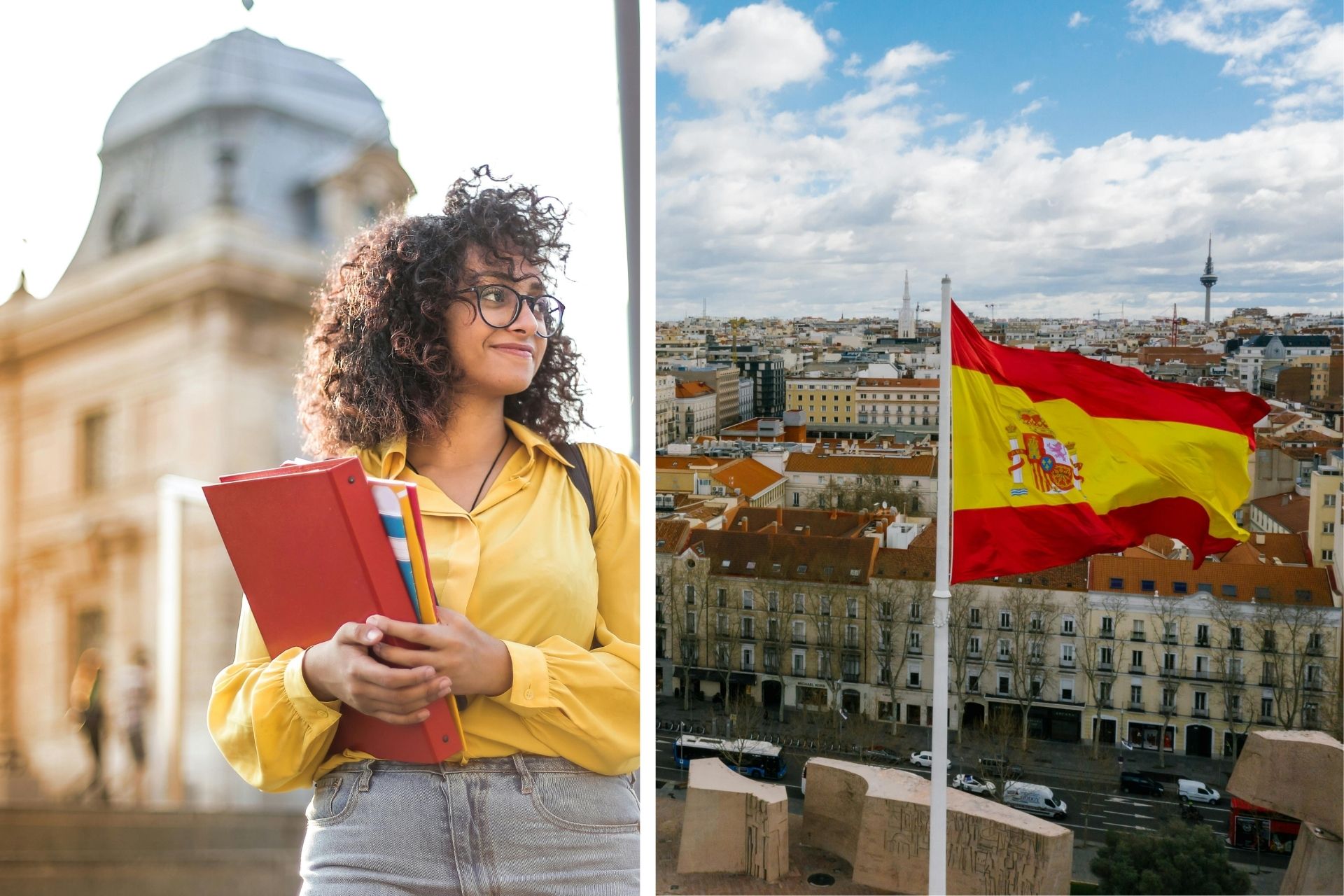How to study in Dubai as an international student?
Here we tell you the details of how to study in Dubai as a foreigner: Visas, requirements, cost of living and every step of the process.
Thinking about your academic future in this city of the Emirates? Brilliant choice! The United Arab Emirates ranks among the top destinations for international students, hosting around 38,000 every year. Not sure how to study in Dubai as a foreigner? This guide will help you understand Dubai’s education system, what levels of study you can pursue, the languages used, and the steps required to expand your academic horizons. Ready to explore?
How does the education system in Dubai work?
Dubai’s education system is structured across three levels: primary, secondary, and tertiary. The first two are free and compulsory for Emirati citizens who attend public schools overseen by the UAE Ministry of Education. Arabic is the main language of instruction, with English taught as a second language. International students and non-citizens typically attend private institutions, which are regulated by the Knowledge and Human Development Authority (KHDA). In fact, private schools currently account for 90% of all education in Dubai.
When it comes to higher education, international students have access to 32 private campuses in Dubai registered with the KHDA. These institutions offer a wide range of undergraduate and postgraduate degrees. Undergraduate programmes follow international models—mainly British, American, or Indian—and typically last three to four years. Postgraduate studies usually take one to two years to complete.
Most courses are taught in English, as they’re designed for a diverse student population. Popular fields of study include engineering, business, and design.
Requirements to Study in Dubai as a Foreigner
How to Study in Dubai as a Foreign Student? The first step is to make sure your legal documents are in order. You’ll need these to enter the country and begin your academic journey without delays. Here’s what you’ll need to prepare:
- A valid passport with at least six months’ validity from your arrival date in Dubai.
- Recent passport-sized photos with a white background
- An official letter of acceptance from your chosen educational institution. This is essential for both your visa application and enrolment process.
- You’ll also need a student visa to reside legally in the UAE throughout your studies. The cost of this visa depends on the length of your programme. A 3-month visa costs around $340, while a 12-month visa can exceed $1,000. It’s best to apply at least two months before your planned departure.
- You must also show proof of financial means, which can be a scholarship, parental sponsorship, or your own income to cover living expenses in Dubai.
- Medical tests Depending on your programme,medical tests may be required to ensure you’re free of contagious diseases.
- Lastly, you may need to provide proof of accommodation, especially for your first weeks in Dubai. This ensures that you have a confirmed place to stay upon arrival.
Steps to Study in Dubai as a Foreigner
It’s time to start planning your next academic and cultural adventure. To reach your goal of studying in Dubai, it’s essential to understand every step in the process. This section will guide you through everything—from the moment you consider the idea to your arrival in the city, ready to begin your course or university degree. Let’s make sure you don’t miss a thing.
1. Research universities and courses in Dubai
The first step on this journey is choosing the university or academic centre where you’d like to study. Will you choose the University of Wollongong, Middlesex University, or the British University in Dubai? Your decision should be based on factors like the course offerings, admission requirements, and total costs—always keeping your professional goals in mind
Before applying, make sure the university offers the degree or course you want to pursue. Most programmes in Dubai are taught in English, so one of the main international admission requirements is proof of English language proficiency. As for the tuition fees, they vary depending on the institution and the duration of the programme. Here’s a basic comparison between long-term degree studies and short courses in Dubai:
| University Studies | Short courses: | |
| Duration | Bachelor’s 3–4 years; Master’s degrees: 1–2 years | Varies from a few weeks to several months |
| Cost | Higher due to the length and depth of study | Lower costs, as they focus on specific areas |
| Language of instruction | Mainly English; some programmes available in Arabic | Mostly delivered in English |
| Purpose | Provides a full academic education and research opportunities | Focuses on developing practical skills in targeted professional areas |
| Career Opportunities | Offers strong academic recognition and job opportunities locally and abroad | Ideal for skill upgrades, additional training, or career changes |
Comparison between studying a degree and doing a short course in Dubai.
2. Explore Study Funding Options in Dubai
Another key part of studying in Dubai as an international student is figuring out how you’ll fund your education. Annual tuition fees for undergraduate and postgraduate degrees range between 37,500 AED and 75,000 AED (around $10,200 to $20,500). And that’s just for academic expenses. Dubai is known for its luxury, and you might think funding your studies there is out of reach. But don’t worry—there are several financing options available. Just make sure to start the application process early.
- Institutional scholarships Some universities, like the United Arab Emirates University, offer scholarships covering 15% to 50% of tuition fees. These are aimed at outstanding international students who meet all academic and admission criteria.
- International programmes Programmes like Fulbright provide financial support for international students looking to study in Dubai. These are highly competitive, so prepare your application carefully.
- Student loans and sponsorships You can also look for sponsorship opportunities or government-funded education loans in your home country.
- Part-time work If you hold a valid student visa and are enrolled in a course that lasts at least 24 weeks, you’re allowed to work part-time in Dubai.

3. Apply for a Study Programme in Dubai
Once you’ve sorted out your funding plan, it’s time to apply to the study programme of your choice. The process may vary slightly depending on the institution, so it’s important to follow each step carefully. In general, admissions for most study programmes in Dubai open between January and April. That’s why we recommend checking the official website of your chosen university regularly to avoid missing important deadlines. To give you a clear idea, here are some general requirements:
- Application form You’ll need to complete the application form provided by the university. This is usually available on the institution’s official website.
- Academic documents You must submit proof of your previous studies. This includes your high school diploma for undergraduate programmes or your degree certificate for postgraduate applications. Some universities set minimum grade requirements. For example, the engineering programme at the University of Wollongong in Dubai (UOWD) requires EmSAT scores of at least 1,300 in maths and 1,000 in physics.
- Personal essay or motivation letter This is your opportunity to explain why you chose the programme and how it fits your academic and professional goals. Most institutions require this as part of their standard application.
- Application fees Some universities charge a non-refundable fee, typically ranging between $50 and $100. The exact amount depends on the institution and the specific programme.
- English language proficiency Since most programmes are taught in English, you must show certified proof of your language skills. Accepted exams usually include IELTS, TOEFL, or PTE Academic.
Once you’ve gathered all the required documents for your chosen programme, make sure to submit them according to the university’s instructions. This could be via an online platform or through physical document delivery. Each institution has its own process and deadlines, so don’t take anything for granted. Stay alert and check for updates regularly to ensure a smooth application experience.
4. Apply a for Student Visa to Study in Dubai
You can only start your student visa application after receiving official confirmation of acceptance from your chosen institution. This acceptance letter is the main requirement to begin the Student visa process in Dubai.
Student visas in Dubai are usually granted for three months to one year, depending on the length of your course, Bachelor’s degree, Master’s, PhD, or postgraduate programme. If your course is shorter than 90 days, you don’t need a student visa. In that case, you can enter the country with a long-stay tourist visa instead.
Depending on the duration of your studies in Dubai, you may qualify for one of the following student visa types:
- Three-month visa: Ideal for short courses lasting at least eight weeks.
- Six-month visa: For programmes of at least 16 weeks.
- Twelve-month visa: Required if your course lasts 24 weeks or more.
The visa application process typically takes two to four weeks, so it’s best to start it as soon as your admission is confirmed. Many universities in Dubai sponsor international students and offer direct support with the visa process. This can speed things up and ensure everything is done correctly. Make sure to stay in touch with your university to receive guidance and take advantage of any available benefits.
5. Moving to Dubai
eyond understanding how to study in Dubai as an international student, you also need to plan for daily life in this vibrant, cosmopolitan city. Here are some key aspects to consider:
- Accommodation Student housing and shared apartments are the most affordable options. Prices range from $300 to $550 per month for student residences, and between $500 and $900 for shared or private rooms in apartments. If you prefer more privacy, fully private apartments start at $1,000 or more per month. It’s best to look for housing close to your university to save on commuting time and keep costs lower.
- Health insurance Get international health insurance before your arrival. Without a valid policy, you’ll need to pay out-of-pocket for medical care in public or private clinics. Having coverage protects you in case of illness or accidents.
- Public transport: Dubai has a reliable and modern public transport system. It has a metro, buses, and taxis. The metro runs from 5 AM to midnight on weekdays and until 1 AM on weekends.
- Lifestyle: Dubai is fast-paced, with an active business environment and endless options for shopping, entertainment, and dining.
- Cultural differences. Although Dubai is a global city, some areas are more traditional. Dress modestly in public spaces and avoid public displays of affection.
6. Conectivity in Dubai
When you move to Dubai for your studies, having a reliable internet connection is essential. You’ll need it for your academic work, staying in touch with family, navigating the city, and so much more. Avoid the hassle of searching for expensive local Dubai SIM cards you’ll only use for a few months. Instead, choose the global connectivity of Holafly Connect—an eSIM you can activate as soon as you land in Dubai.
Holafly Connect offers three monthly subscription plans:
- 10 GB Plan ($39.90): Perfect for browsing, checking emails, and staying connected on campus.
- 25 GB Plan ($49.90): Ideal for video calls, collaborative tools, and downloading study materials.
- Unlimited Plan ($64.90): Best for heavy users who need constant, unrestricted internet access and want to share it across multiple devices.
Important: If you are a frequent traveler and want to stay connected without worrying about expensive roaming or looking for a new SIM at every destination, Holafly’s subscription plans are for you. With a single eSIM, enjoy internet in more than 170 countries for a fixed price and no surprises on your bill. Travel without limits and connect easily and securely! 🚀🌍

When and How to Validate Your Qualifications in Dubai
If you plan to pursue an academic degree in Dubai, your foreign qualifications must be officially recognised by the UAE. What does this mean? You’ll need to complete a validation or equivalency process to confirm your documents meet the academic requirements for university enrolment in the country.
You must begin this process before officially enrolling at your chosen institution in Dubai. Processing times range from one to three weeks and include the following steps:
- Legalisation and translation in your home country First, take your academic certificate to your country’s Ministry of Education for legalisation. If your documents are not in English or Arabic, you’ll need a certified translation into one of these languages.
- Legalisation by the Ministry of Foreign Affairs Next, present both the legalised document and its translation to your Ministry of Foreign Affairs for international certification.
- Certification at the UAE Embassy Submit your documents to the UAE Embassy in your country to receive the final certification required for use in the Emirates.
- Equivalency Certificate in the UAE After arriving in Dubai, apply for an Equivalency Certificate from the UAE Ministry of Education. This document confirms that your academic background is equivalent to Grade 12 in the UAE. It’s essential for continuing your higher education and may be requested after your first academic semester.

How much does it cost to study in Dubai as a a foreigner?
What about other living expenses? Besides tuition fees, it’s crucial to factor in the monthly cost of living in Dubai. Day-to-day expenses like food, transport, and utilities can add up quickly. Here’s an overview of estimated monthly costs for a student living in Dubai:
| Category | in US dollars |
| Accommodation | |
| Shared Room | $500-700 |
| Private room | $900 |
| Food | $150-250 |
| Transport | $80 |
| Utilities | $150 |
| Phone & Internet | $60 |
| Leisure and entertainment | $100 |
| Approximate monthly total | $1,040-1,540 |
Cost of living in Dubai
These basic living expenses are in addition to annual tuition fees, which typically range from $10,000 to $20,000 for undergraduate programmes and $15,000 to $20,000 for postgraduate studies.
Study Online in Dubai as a Foreigner
If relocating to Dubai isn’t an option, you can still pursue quality education through online programmes offered by top institutions in the city. Studying online eliminates the need for expenses like housing and daily transport, allowing you to invest more directly in your education. Several institutions in Dubai offer flexible and recognised online programmes for international students, including:
- Global Business Studies (GBS): Offers online programmes like the Higher National Diploma (HND) in International Business.
- University of Birmingham Dubai: Provides remote learning options in various fields for students around the world.
- Middlesex University Dubai: Features online courses in business, IT, and law tailored for students needing flexible study options.
These online programmes follow the same academic standards and entry requirements as their on-campus counterparts. This ensures that all students receive a high-quality education and go through the same rigorous admission process.
Frequently Asked Questions about Studying in Dubai as a Foreigner
Yes, if your course lasts more than 90 days. Dubai offers student visas for 3, 6, or 12 months, depending on the length of your programme.
Annual tuition fees range from $10,000 to $20,000 for undergraduate degrees and $15,000 to $20,000 for postgraduate studies. Monthly living expenses typically fall between $1,040 and $1,540.
Yes, you can work part-time if you hold a valid student visa and your course lasts at least 24 weeks. You can only work part-time.
You can apply for institutional scholarships that cover up to 50% of tuition, explore programmes like Fulbright, seek education loans, or consider online study options to reduce costs while accessing top-quality education.
You must legalise, translate, and certify your academic documents in your home country and at the UAE Embassy. Once in Dubai, apply for an Equivalency Certificate from the UAE Ministry of Education.





 Language
Language 


















 No results found
No results found







